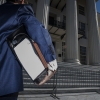|
Getting your Trinity Audio player ready...
|
The 2024 comprehensive gambling bill made its first public appearance on Tuesday, at a public hearing in the House Economic Development and Tourism Committee. There were no surprises.
For more than an hour, 18 speakers took their three-minute turns to voice either their concerns about the legislation or to explain why the legislation will be great for the state/their organization. There were passionate stories of addiction, farfetched and debunked anecdotes about increased crime and human trafficking, praise from veterans groups and a thorough and eloquent explanation from executive director for the Alabama Council for Behavioral Healthcare on how gambling tax revenue might finally assist Alabamians with mental health issues.
“Mental health desperately needs a new revenue stream that will transform our communities, the system, and most importantly, the lives of Alabamians who are really struggling right now,” said Holly McCorkle, the Executive Director of the Alabama Council for Behavioral Healthcare. She went on to describe the results of a recent survey showing that 90 percent of Alabamians named mental health care as a growing concern in the state and that nearly half of those who reported a mental health issue within the previous year said they couldn’t find immediate health.
The proposed gambling legislation, which would establish a statewide lottery, sports wagering and 10 casino locations around the state, is projected to bring in somewhere around $1 billion annually in tax revenue, with a major portion of that devoted to health care and mental health care.
That would include a significant increase in services available for gambling addiction – services that are almost nonexistent in the state currently despite hundreds of current gambling options.
Concerns about increases in gambling addiction were a centerpiece for opponents of the bill. Several speakers told personal stories of their struggles with gambling addiction and watching those close to them go through similar issues with less fortunate endings.
Almost all of their stories, however, took place either in Alabama or in a neighboring state that offers some form of gambling, with the addicts unable to find help for their problem in the state. One speaker, Tim Ritchie, credited a Louisiana gambling addiction center similar to the ones that would be funded by the gambling legislation for helping him overcome his addiction.
Another popular argument from opponents was the crime that was certain to follow the opening of any casino. Kimberly Cook, a Vestavia Hills councilwoman, proclaimed that human trafficking increases by 80 percent around a new casino and that illegal drugs and prostitution are more common around casinos. None of those claims is true.
A 2003 study from the National Institute of Justice looked at the effects of casinos on crime in the towns where they were located and compared those numbers to crime rates in other, similar cities. The result: “Overall, casinos do not have any systematic effect on crime ….”
Near the end of Tuesday’s meeting, state Rep. Allen Treadaway, who serves on the Economic Development and Tourism Committee noted that three former governors were in the audience for the hearing. He asked chairman Rep. Andy Whitt to allow them to speak, so everyone “could get their thoughts on the legislation.”
Whitt calmly declined, noting that the former governors had not signed up to speak, a strict rule for public hearings.
No vote was taken on the legislation Tuesday. The committee will be back for another meeting on Wednesday, at which time members will be voting.





















































